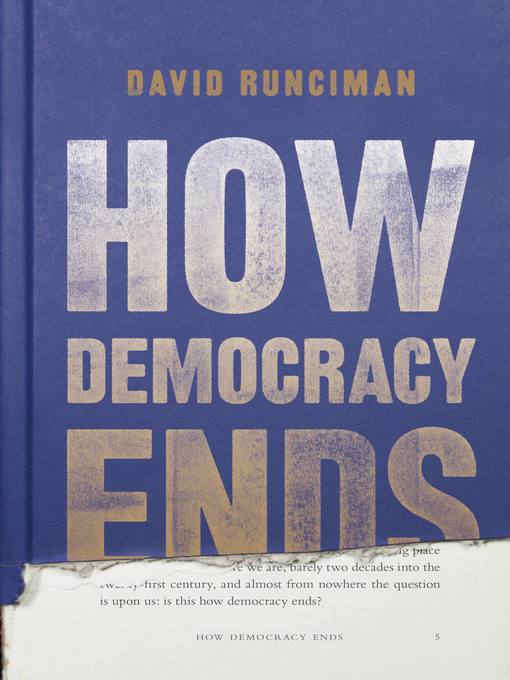
How Democracy Ends
کتاب های مرتبط
- اطلاعات
- نقد و بررسی
- دیدگاه کاربران
نقد و بررسی

April 2, 2018
Political philosopher Runciman (The Confidence Trap: A History of Democracy in Crisis from World War I to the Present) provides a meandering exploration of “the malaise of contemporary democracy” and identifies various possible means by which it might end. Runciman contends that observers who worry about the collapse of democratic institutions all too often focus on signs of democratic failure familiar from the last century: “backsliding” into “fascism, violence, and world war.” Rather, Runciman theorizes, democracy is going through a “midlife crisis,” and when the end comes, “we are likely to be surprised by the form it takes.” The book examines several potential democracy enders: coups, the lurking disasters of climate change or nuclear war, and technology or corporations running amok. It also considers potential replacements for democracy: pragmatic authoritarianism, epistocracy—the distribution of power based on knowledge—and submission to artificial intelligence. This work is thought-provoking about the defects of contemporary democratic politics, but the free-flowing and loose structure and Runciman’s avoidance of claiming certainty can make it inconclusive and uninspiring. Those who welcome encouragement to consider all sides and avoid jumping to conclusions, however, will find this a reasoned and balanced analysis of the political moment.

May 1, 2018
The good news: Even Donald Trump hasn't been able to kill democracy. The bad news: Yet."Democracy," writes Runciman (Politics/Cambridge Univ.; Politics: Ideas in Profile, 2015, etc.) provocatively, "is civil war without the fighting." In the broadest terms, it fails when that symbolic war turns into a real one. By that account, we're doing OK, inasmuch as even the pitched battles among right- and left-wingers in the United States have not yet descended into bloodshed. The author would seem to share with Steven Pinker the view that the Enlightenment is still alive, if not exactly well, and that overall, we're in better shape than our forerunners in terms of political violence and the ability to accommodate widely divergent views. It could have been otherwise; Runciman opens with a threefold view of possibilities for what might have come of the 2016 election, including the sitting president's refusing to yield office, "the route to civil war," and what actually happened, namely Trump's gaining that office even as "the American political establishment decides to grin and bear it." Reminding readers that authoritarianism comes with executive edicts and not the slow-working legal process, Runciman counsels Americans to breathe a little easier on Trump's judiciary appointments--though, of course, those appointments may be in effect for a generation and more. In the face of Trumpian attacks on laws and customs, he suggests that the institutions of democracy are proving resilient in being effective bulwarks against tyranny. Which is not to say that things can't be improved, especially as an aging population shows less stamina for the hard work of engaging in representative democracy, a system that Runciman holds is "intended to work against our cognitive biases" in thwarting immediate gratification in favor of long-term benefits.Democracy isn't dead, not yet, but it could use some physical therapy while it steps gingerly into the grave. For all its optimism, an urgent, necessary book of cold comforts.
COPYRIGHT(2018) Kirkus Reviews, ALL RIGHTS RESERVED.

June 1, 2018
Runciman (political science, Cambridge Univ.; Political Hypocrisy: The Mask of Power from Hobbes to Orwell and Beyond) paints a compelling portrait of Western democracies' decline. The author begins with describing how the failure of Western democracies will be unlike those of the past, which were marked by violence and coups. With a particular emphasis on shifting political environments in Greece and the United States, while arguing that these political systems are not currently at the end point, he posits that Western democracy is past its prime: "Western democracy will survive its mid-life crisis.... This is not, after all, the end of democracy, but this is how democracy ends." Runciman's theories are not all gloom, however. Throughout, he discusses the idea that the end of Western democracy will not be the death of democracy or of human life. In addition, he provides hope that this change could signal the beginning of a new, higher functioning political system. VERDICT This title will appeal to readers who are questioning the present state of politics and government.--Mattie Cook, Flat River Community Lib., MI
Copyright 2018 Library Journal, LLC Used with permission.

























دیدگاه کاربران